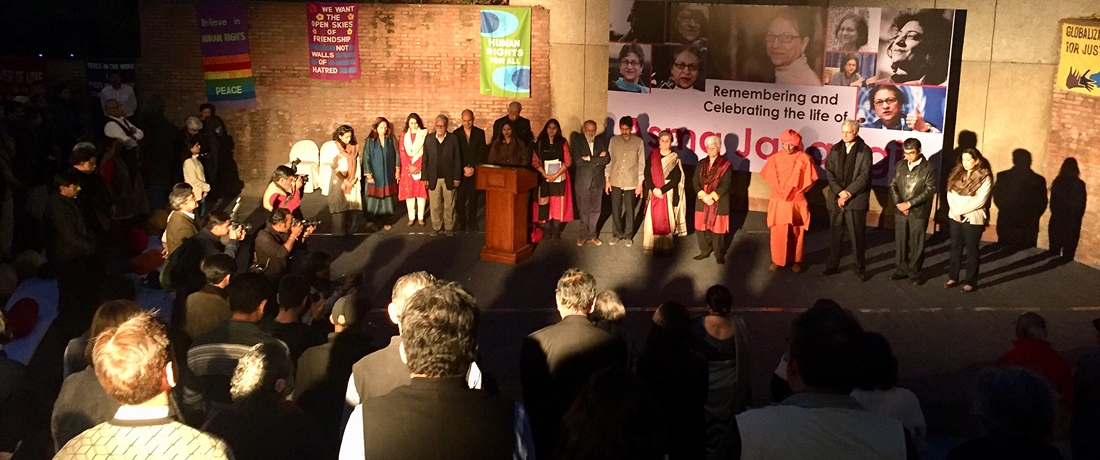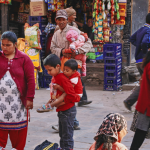She was a prominent Pakistani human rights lawyer, the co-founder and Chair of the Human Rights Commission of Pakistan, and UN Special Rapporteur on Freedom of Religion. Besides this she held many other prominent positions. She was Asma khala to me – an adopted aunt and a friend – and as for many human rights’ lawyers a guide, a mentor and an inspiration.
Asma khala was fearless and was driven by a firm belief in and commitment to, the rule of law, democracy and social justice. Before she even became a lawyer, she challenged the detention of her father Malik Ghulam Hussain Jilani under Martial Law Regulation No.78 of 1971 in court. In Asma Jilani v. Govt. of Punjab & Another it was held by the Supreme Court that Martial Law did not override the constitution and that the arrest of her father was unlawful. Zulfikar Ali Bhutto, President at the time was forced to declare the end of Martial Law in 1972.
After training as a lawyer, she used the law to challenge whatever injustice was brought to her attention, in the lowest and highest courts, in family and constitutional matters. As part of her commitment to access to justice, she co-founded AGHS legal aid cell in 1987, the first legal aid law firm in Pakistan. Their work continues to focus on women and criminal law, family law, inheritance law, freedom of expression and discrimination against minorities in Pakistan. Importantly, they provide legal aid and pro bono legal services to vulnerable clients as well as train and support cohorts of community paralegals to empower people with knowledge of the law.
In 1995, Asma khala took on an appeal case that nobody would touch. Salamat Masih, an illiterate eleven-year old Christian boy and his two adult uncles were accused of blasphemy under the section 295 of the Pakistan Penal Code 1860 and sentenced to death. A local imam claimed that the child had written words against the Prophet (PBUH) on the wall of a mosque. The case was controversial and raised communal tension, Manzoor Masih one of the accused was shot to death after a hearing at the Lahore High Court. Asma khala’s own home and family were attacked by gunmen and the Christian community across the Punjab province was targeted. Undeterred, her incisive legal arguments won the case and she fought to secure safe passage to a life outside Pakistan for Rahmat and his family.
Asma khala was a big believer in family and in marriage. She herself married for love and believed in a woman’s choice and free will in all aspects of her life. In Hafiz Abdul Waheed v. Asma Jehangir PLD 2004 SC 219 or the Saima Waheed Case the legal question was whether the consent of the wali (male guardian) is essential to the validity of a nikah (marriage) of a sui juris Muslim girl. The case against Asma khala was lodged by Saima Waheed’s father, alleging that she had kidnapped his daughter and held her by force at a women’s refuge. Ultimately, the Supreme Court upheld previous decisions of the Federal Shariat Court and Supreme Court that adult Muslim girls can marry of their own free will, and did not require the consent of their Wali and other relatives. All charges against Asma khala for kidnapping were also dropped. I recall from my time working with her in Lahore that women, in the most dire and painful situations, travelled across Pakistan to seek her help. She did not turn anyone away.
Just as legal empowerment, human rights, social justice, equality, and peace seemed to be part of Asma khala’s DNA, her love for her family and friends was also. Her joie de vivre and sense of humour – the inimitable smile that could presage a wicked joke or warm reassurance of love remain in the hearts of those who knew her. As I write about her now in the past tense, I have tried to focus on her legacy and what she has left behind for all of us. I know I can speak for a whole generation of lawyers that, through her professional and personal life Asma khala inspired us to live our lives the way we want to and believe that we can change our society for the better.
Mariam Faruqi – South Asia Regional Director, iProbono







